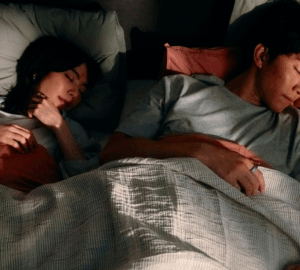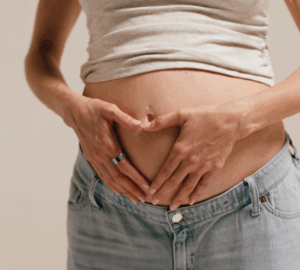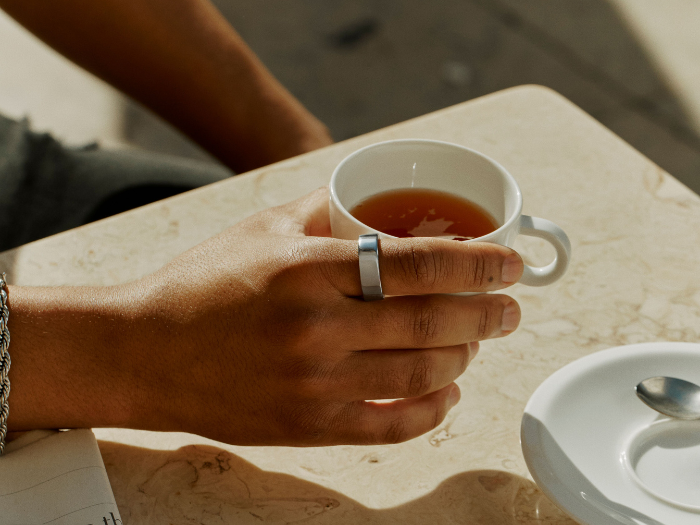For many, a morning cup of coffee is a cherished ritual. And we’re not here to tell you to give it up. In fact, moderate caffeine intake has been linked to a lower risk of several diseases, including type 2 diabetes, heart disease, and certain cancers.
However, if your caffeine consumption stretches from a morning cup (or two) to lunchtime lattes and afternoon cappuccinos, it’s crucial to understand how caffeine impacts your sleep quality.
Keep reading to discover how caffeine impacts Oura members’ sleep data, factors that influence how your body metabolizes it, and how to time your cup of joe to keep it from ruining your sleep.
How Caffeine Impacts Oura Members’ Sleep
In Oura member data, we see a fairly significant impact when members tag “caffeine” compared to a day when they don’t tag “caffeine.” According to aggregate and de-identified member data from January to June 2025, these members experienced:
- 49 minutes less total sleep
- 6.4 minutes less REM sleep
- 23 minutes less light sleep
- 9.2 minutes less deep sleep
- 8.2 points lower Sleep Scores
RELATED: How Does Alcohol Impact Oura Members?
How Caffeine Impacts Your Sleep Cycle
 Your body’s delicate sleep-wake cycle, primarily governed by your 24-hour circadian rhythm and a complementary sleep pressure system, is highly susceptible to disruption by caffeine.
Your body’s delicate sleep-wake cycle, primarily governed by your 24-hour circadian rhythm and a complementary sleep pressure system, is highly susceptible to disruption by caffeine.
Caffeine makes you feel alert by tricking your brain by crossing the blood-brain barrier and blocking adenosine, a key brain molecule (neurotransmitter) that signals sleepiness.
Typically, the longer you’re awake, the more adenosine accumulates in your brain, building sleep pressure. It binds to receptors, sending “sleep now!” signals throughout your body. When you do finally sleep, this slate is wiped clean, effectively resetting your adenosine levels.
But when caffeine enters the brain, it effectively “fits” into these same receptors, preventing adenosine from binding. This causes your brain to falsely register that it has been awake for a shorter period, leaving you feeling more alert and less sleepy.
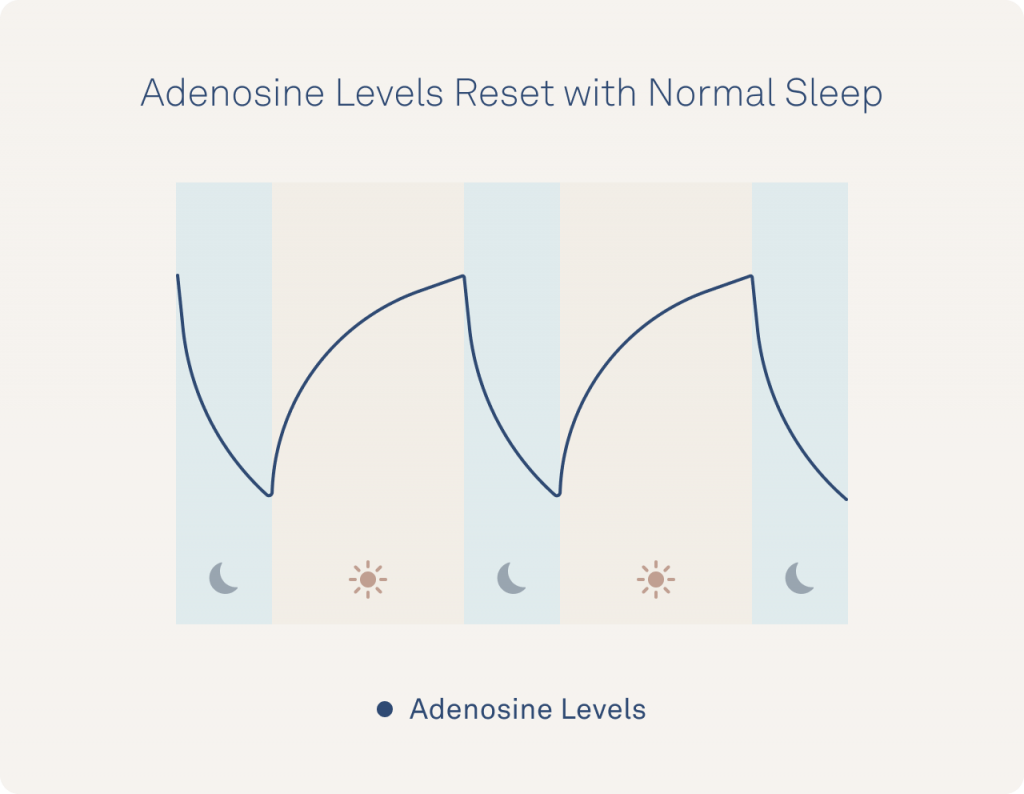
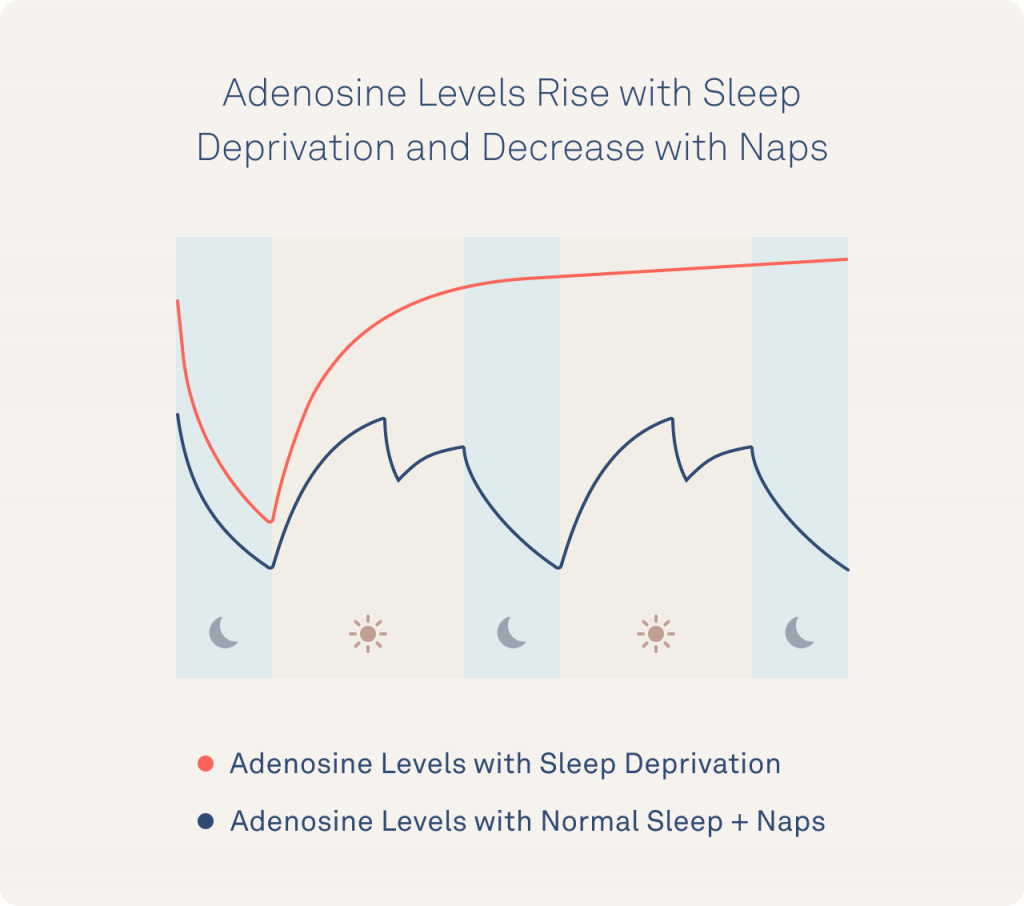
When caffeine finally leaves your system, you may experience a “caffeine crash.” This is because all the adenosine that was blocked has been building up, and once the caffeine clears, it binds to those receptors all at once, leading to an intense wave of sleepiness.
The severity of this experience—and how quickly it happens—varies significantly from person to person, as caffeine is cleared from the body at different rates.
RELATED: Should You Delay Morning Caffeine?
Caffeine Half-Life: How Long Does Caffeine Stay In Your System?
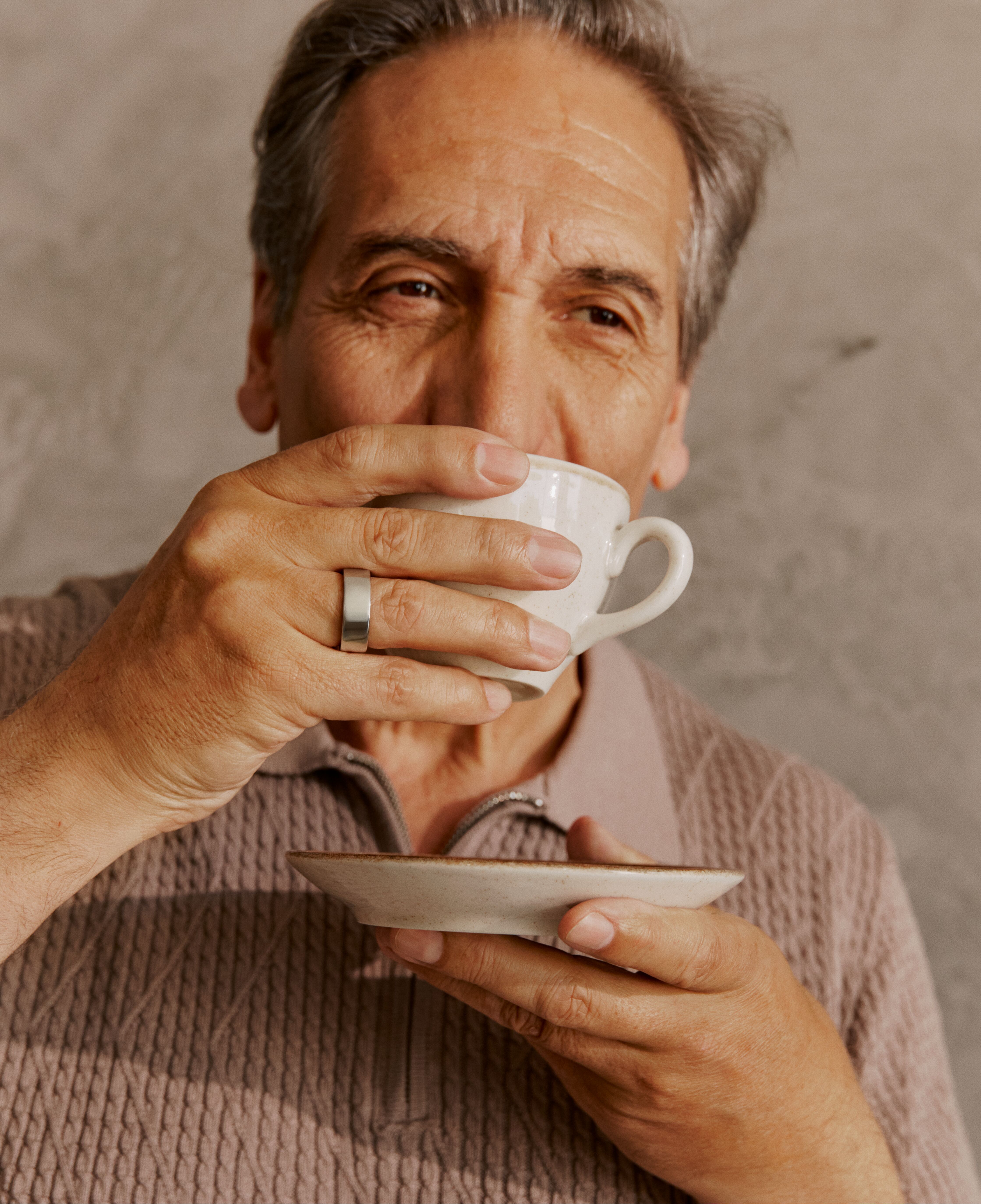 The half-life of caffeine refers to how long it takes for your body to metabolize half of the caffeine in your system—and understanding this is critical to ensure quality rest at night.
The half-life of caffeine refers to how long it takes for your body to metabolize half of the caffeine in your system—and understanding this is critical to ensure quality rest at night.
Caffeine has a typical half-life of 3 to 7 hours. However, individual variations can occur, and the half-life can range from 1.5 to 9.5 hours, with the average being about 5 hours.
So if you enjoy a cup of coffee at 3pm, you’ve only metabolized half of that caffeine by 8pm—the other half is still actively circulating in your system, impacting your sleep onset and sleep architecture (your ability to move through all the sleep stages).
If you’re a slow metabolizer, that impact can extend even longer.
Caffeine Metabolism: Are You a Fast or Slow Metabolizer?
Ever wondered why your friend can have an after-dinner espresso and sleep like a baby while you’re staring at the ceiling after a lunchtime latte? Your ability to handle caffeine isn’t just about how much you drink—it’s rooted in your biology.
From genetics to hormones and lifestyle, several factors determine how long caffeine lingers in your system and how it impacts your sleep:
Genetic Factors
Your genes play a key role in how your body breaks down caffeine. The primary gene involved is CYP1A2, which influences the activity of an enzyme in your liver responsible for metabolizing caffeine. People with a variant of this gene produce less of the enzyme, meaning they break down caffeine more slowly. These individuals are often called slow metabolizers.
Roughly half of the population carries this slower-metabolizing variant, which can extend caffeine’s half-life significantly, sometimes up to 10 hours or more.
On the flip side, fast metabolizers break caffeine down more quickly, clearing it from their system faster and often tolerating later-day coffee with fewer sleep-related side effects.
Understanding your genetic caffeine sensitivity isn’t just helpful for sleep—it’s also linked to broader health outcomes. Research suggests that slow metabolizers may face increased cardiovascular risks when consuming large amounts of caffeine, especially from coffee.
Hormones, Birth Control, and Caffeine’s Effects on Sleep
Hormones can significantly affect how your body processes caffeine.
Menstrual Cycle
For women, estrogen appears to slow caffeine metabolism by inhibiting the CYP1A2 enzyme. This means that during certain phases of the menstrual cycle—particularly the luteal phase when estrogen and progesterone levels are higher—caffeine may linger in the body longer and have a more pronounced effect on sleep.
| Member Tip: Understand your cycle throughout all the phases Oura’s Cycle Insights. |
Birth Control
This effect is even more pronounced for those taking oral contraceptives. Studies show that the half-life of caffeine can double in women on hormonal birth control—sometimes increasing from the typical 5–7 hours to over 10 hours. As a result, even a modest afternoon caffeine dose may disrupt sleep.
Pregnancy
Pregnancy is another key hormonal state that affects caffeine metabolism. During pregnancy, particularly in the third trimester, caffeine clearance slows dramatically. The half-life can extend to 11–18 hours, increasing both its stimulating effects and potential impact on fetal development—hence the advised limit of 200 mg per day during pregnancy.
READ MORE: 9 Coffee Alternatives to Try During Pregnancy
Other Factors
Besides genetics and hormones, several other factors can influence how quickly your body metabolizes caffeine:
| Factor | How It Affects Metabolism |
| Age | Caffeine metabolism tends to slow with age, especially in older adults. |
| Liver Function | Liver disease or impaired liver function reduces the breakdown of caffeine. |
| Smoking | Increases CYP1A2 enzyme activity, speeding up caffeine clearance by up to 50%. |
| Diet | Cruciferous vegetables (e.g. broccoli, kale) may enhance CYP1A2 activity. |
| Medications | Certain drugs (e.g., fluvoxamine, cimetidine) inhibit caffeine metabolism; others speed it up. |
| Alcohol Consumption | Alcohol inhibits caffeine metabolism by reducing CYP1A2 activity. Studies show that alcohol intake of 50g per day prolongs caffeine half-life by 72% and decreases caffeine clearance by 36%. |
| Chronic Stress | Stress can dysregulate the body’s stress response system, particularly the HPA axis, leading to increased cortisol production. This, in turn, can affect how caffeine is processed, potentially prolonging its effects or making them more intense. |
When to Stop Caffeine for Better Sleep

There’s no one-size-fits-all answer for when to stop drinking caffeine—but timing matters more than you think. Because caffeine’s half-life ranges from 5 to 7 hours (and even longer for slow metabolizers), that late-afternoon latte can still be in your system by bedtime, disrupting both your ability to fall asleep and your sleep quality.
Sleep researchers and clinicians generally recommend cutting off caffeine at least 8–10 hours before bedtime. For most people, that means no caffeine after 2pm—and even earlier if you’re especially sensitive or tend to struggle with falling asleep.
Even small doses of caffeine (like a piece of dark chocolate or a green tea) can interfere with your body’s ability to produce and respond to adenosine, the molecule that builds sleep pressure throughout the day.
READ MORE: 8 Foods and Drinks For Better Sleep (And 4 To Avoid!)
Tracking Caffeine’s Impact with Oura: Metrics for Better Rest
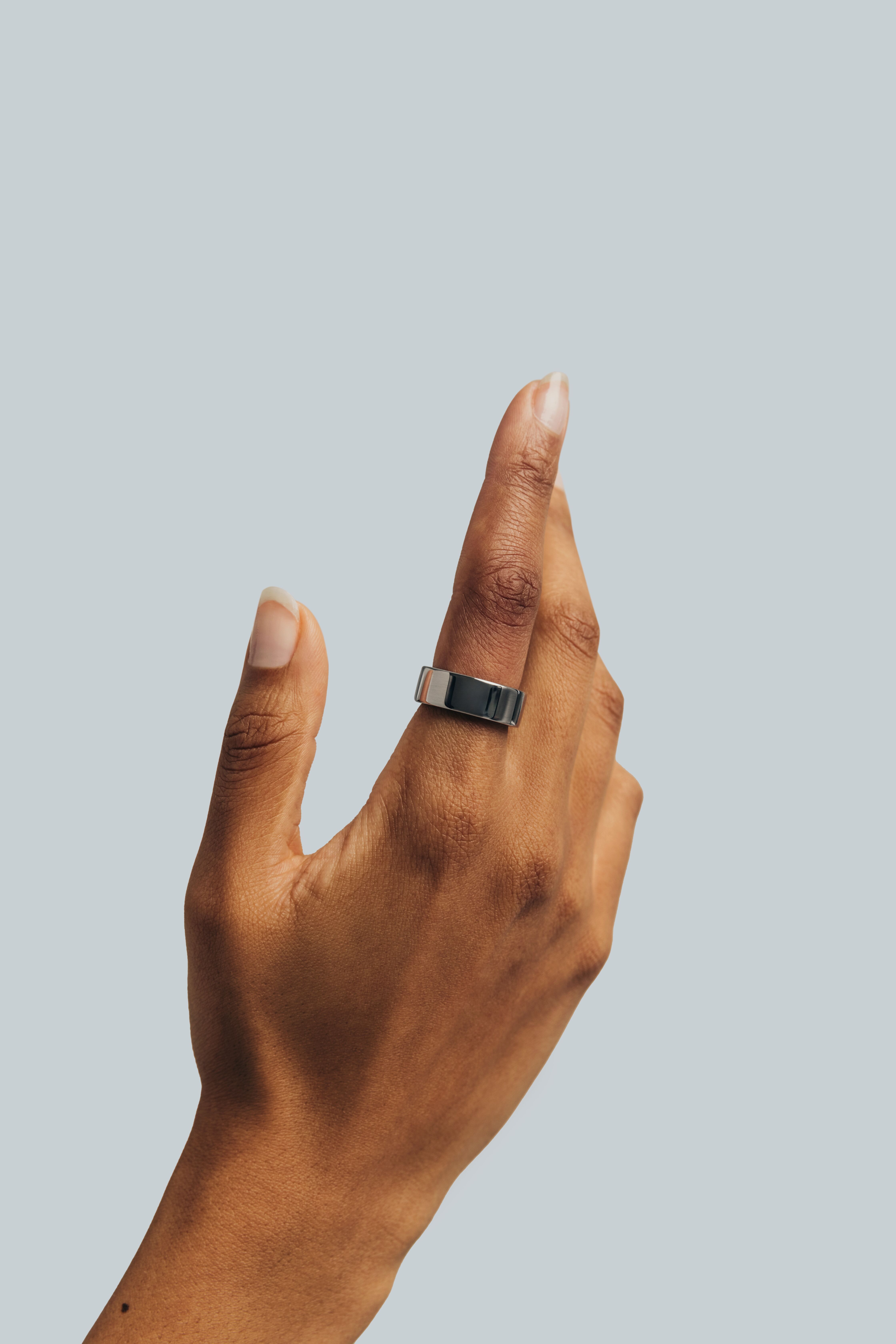 With Oura, you can see how even a small dose of caffeine impacts your sleep and recovery by keeping an eye on key metrics.
With Oura, you can see how even a small dose of caffeine impacts your sleep and recovery by keeping an eye on key metrics.
Start by using Tags in the Oura App to log when you consume caffeine. Over time, you’ll begin to see patterns in how your body responds, especially when caffeine is consumed later in the day.
Here are a few sleep and recovery metrics to watch:
- Resting Heart Rate (RHR): Caffeine stimulates your nervous system and can elevate your RHR, making it harder for your body to wind down. You may notice a higher average RHR throughout the night or a delayed drop to your lowest point.
- Sleep Latency: If it takes you longer than usual to fall asleep, caffeine could be the reason—especially if consumed in the afternoon or evening.
- Time Awake & Sleep Efficiency: Caffeine can cause more frequent nighttime awakenings, reducing your overall sleep efficiency and leaving you feeling groggy the next day.
- HRV (Heart Rate Variability): A stimulant like caffeine may reduce your HRV, a marker of recovery and parasympathetic nervous system activity.
RELATED: Why Do I Wake Up Tired? How to Feel More Alert in the Morning







